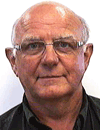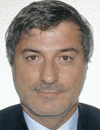Other Track AgendasBiotherapeutics | Cell Culture | Single Use Technologies | Stem Cells |

Wednesday, 27 June 201208:00 | Registration | |
Session: Translational Projects in the Stem Cells Space |
| | 09:30 | Towards the in vitro Generation of Red Blood Cells from Pluripotent Stem Cells
Jo Mountford, Lecturer, University of Glasgow, United Kingdom
Blood Transfusion has become a mainstay of modern medical practice. However problems persist both nationally and internationally in maintaining adequacy of supply. We are working to generate red blood cells in vitro from pluripotent stem cells, however the extremely large cell numbers involved pose unique challenges to culture technology and scale-up. I will present our progress in addressing the biological, technical and regulatory issues of this project. | 10:00 | Bioprocess Engineering of Human Stem Cells for Cell Therapy and Drug Discovery Applications
Catarina Brito, Research Associate, Universidade Nova de Lisboa, Portugal
Novel culture and cryopreservation systems for human pluripotent stem cells and neural stem cells will be presented and their advantages and applicability in the production of high quality advanced therapeutic products or functional screening tools for preclinical research discussed. | 10:30 | Coffee and Networking in Exhibition Hall | 11:15 | Stem Cell Therapy for Joint Restoration: A Research Perspective
Cosimo De Bari, Professor/Consultant Rheumatologist, University of Aberdeen, United Kingdom
The opportunities and challenges of development of stem cell-based therapeutic interventions for joint surface repair for the treatment and prevention of osteoarthritis will be discussed. | 11:45 | Stem Cell Research & Cellular Therapy—Current State of the Marketplace
Enal Razvi, Managing Director, Select Biosciences Inc, United States of America
This presentation describes the current state of the stem cells marketplace as it relates to their utilization for pharmaceutical screening as well as their development for cellular therapy. Details are provided about the quantitative market opportunity for various stem cell classes as well as the current state of the clinical trials space wherein stem cell-based therapeutics are being evaluated for therapy in various disease classes. | 12:15 | Lunch and Networking in Exhibition Hall | 13:30 | Poster Session | 14:15 |  | Keynote Presentation Stem Cell Therapies: To the Clinic Through the Clinic
Michael Whitaker, Dean of Research & Innovation, Newcastle University, United Kingdom
Stem cell-based regenerative medicine shows much promise. The challenge is to develop safe and cost-effective therapies. Existing biotech business models are sorely stretched when applied to cellular therapies. Market models based on close clinician-company partnerships are likely to bring the earliest successes. |
| 14:45 | How to Build on the NHS Infrastructure to Deliver Viable Cellular Therapies
Simon Ellison, Commercial Manager, NHS Blood & Transport, United Kingdom
- The criticality of managing the process from consent to patient.
- Value of national quality systems
- How to generate patient focused manufacturing and scale up.
- Accessing validated national cold supply chains.
| 15:15 | Coffee and Networking in Exhibition Hall | |
Session: Pluripotency and Reprogramming |
| | 16:00 | Mechanisms of Nuclear Reprogramming by Eggs and Oocytes
Kei Miyamoto, Research Associate, Wellcome Trust/Cancer Research UK Gurdon Institute Institute , United Kingdom
Reprogramming of differentiated cells can be efficiently induced in oocytes. Actin and actin-binding proteins in the oocyte nucleus play important roles in this reprogramming. | 16:30 | Induction of Pluripotent Stem Cells
Holm Zaehres, Professor, Max Planck Institute, Germany
This presentation will describe the current status of strategies to generate induced pluripotent stem (iPS) cells from mouse and human somatic cells for patient-specific disease modeling and cell therapeutic applications. | 17:00 | Stem Cell Reprogramming with Chemical Agents and Physical Energy: New Perspectives for Regenerative Medicine
Carlo Ventura, Professor, University of Bologna, Italy
For decades scientists have been trying to reproduce cell culture environment for the closest mimicry of the natural cellular “embedding” within a living organism. We will discuss our recent findings in the use of novel chemistry and physical energy, including radioelectric conveyed fields, to optimize stem cell expression of pluripotentiality.
| 17:30 | Issues and Challenges in Clinical Use of Human Embryonic Stem Cell Lines
Dusko Ilic, Senior Lecturer/Reader, Kings College London, United Kingdom
Clinical use of human embryonic stem (hES) cells is already being explored in a several phase1 safety trials. A number of issues and challenges, however, still remain to be solved before embarking to derivation of new clinical grade lines. Master bank characterization, HLA spread accounting for population variation and resolution of genomic stability testing will be discussed. | 18:00 | Drinks Reception |
Thursday, 28 June 2012 |
Session: Pluripotency and Reprogramming cont'd |
| | 09:30 | Human HSCs Transdifferentiated from MSCs can be Used for the Treatment of Blood Diseases and Fabrication of Blood
James Yin, Professor, Institute of Stem Cells, China
Our findings provide the first demonstration that transfection of two small RNAs (sRNA) for two days is sufficient to trigger adipose-derived mesenchymal stem cells (AD-MSCs) to transdifferentiate into hematopoietic stem cells (HSCs) in a large-scale level. | |
Session: Research and Drug Discovery Deploying Stem Cells |
| | 10:00 |  | Keynote Presentation Interaction Between Mesenchymal Stromal Cells and Biological and Artificial Tracheal Scaffolds in Humans
Paolo Macchiarini, Professor, Karolinska Institutet, Sweden
End-stage organ failure is one of the major challenges for
medicine and this can worsen due to demographic changes. Despite enormous
efforts in medical and basic research, allogenic organ transplantation is
probably the only curable treatment option for these patients. However, the
growing shortage of donor organs and the need for life-long immunosuppression
with its associated morbidity are some requirements for novel therapeutic
option. Tissue engineering is becoming a very promising alternative
and focuses on the basic components: i) a scaffold ii) cells iii) a bioreactor
and iv) pharmaceutical intervention/bioactive molecules. Our recent clinical
application of a tissue engineered trachea has demonstrated its the feasibility
to replace damaged tissue and organs with rather simple architecture by using
both synthetic and biological materials. Preclinical findings also suggest that
even higher complex organs, such as the esophagus, lungs or hearts, can be
successfully engineered and transferred to the clinic in the near future.
We are currently investigating underlying pathways and mechanisms of
these mesenchymal stromal cell related clinical improvements. Only
continuous evaluations and re-investigations of the already clinically applied
methodology can provide stronger evidence to transfer the concept into clinical
routine. |
| 10:30 | Coffee and Networking in Exhibition Hall | 11:15 | Screening New Agents: Stem Cells or Cancer Cell lines
John Masters, Professor, University College London, United Kingdom
It has been claimed recently that tissue-differentiated stem cells provide a better screening model for new agents than cancer cell lines derived from the tissues of interest. The relative merits of the two screening systems will be compared. | 12:15 | Lunch and Networking in Exhibition Hall | 13:30 | Poster Session | 14:15 | The Brüstle-Patent-Case – Legal Background and Impacts to European Stem Cell Research and International Cooperation
Timo Faltus, Research Associate, Martin-Luther-University, Germany
The presentation will illustrate the legal background of the Brüstle-Patent-Case to help stem cell researcher to see if their (potential) inventions are affected by the ruling. Furthermore, the presentation will focus on the ruling’s impact to stem cell research in Europe and to international research and industrial applications in the stem cell field. | 14:45 | An Overview of the Regulatory Landscape Relevant to Tissue and Cell Based Therapies within the EU, considering both Adult and Embryonic Stem Cells
Julian Hitchcock, Counsel, Lawford Davies Denoon, United Kingdom
Regulation is cited as the biggest obstacle to investment in regenerative medicine and stem cell science. In this talk, Julian Hitchcock sets out the European legal framework standing between research output and clinical implementation, highlighting some topical issues on the way. | 15:15 | Coffee and Networking in Exhibition Hall | 15:45 | Manipulating Stem Cells to Develop Cancer Models for Drug Testing
William Rideout, Principal Scientist/IACUC Chair, AVEO Pharmaceuticals, Inc., United Kingdom
Applying new genetic engineering tools to ES and tissue specific stem cells enables the rapid construction of an array of new cancer models designed to support drug development in oncology. We have used such cancer models and applied them to target discovery, translational medicine, and biomarker identification and validation. | 16:15 | TALENs™: Genome Customization Tools for Precise Gene Editing of Human Stem Cells
Laure Cannesson, Marketing Communications Manager, Cellectis Bioresearch, France
Human stem cells, especially patient-derived induced pluripotent stem cells, represent power-full candidates for improvements to current drug screening approaches and for the development of novel regenerative medicines. In such applications however, genome customization is needed for genetic-abnormalities repair, as for more efficient and homogenous cell differentiation to a complete mature stage. Targeted gene editing is entering an exciting new era with the recent advent of TAL Effector Nucleases (TALENs™). They are able to bind to any gene and introduce a specific DNA double strand break at any position, enabling genetic modification in any cell type. Furthermore, as TALENs™ hits are found every 2 to 3 nucleotides, TALENs™ offer advances in both flexibility of design and universality of use for gene modification. Here is shown use of TALEN™ in human embryonic and induced pluripotent stem cells, for targeted gene integration applications. Combined with a robust feeder free culture system, DEF –CSTM, TALEN™ allows fusion of the GFP to the beta actin. This is an efficient, robust and precise approach that opens the door to an “on request” stem cells engineering. | 16:45 | Close of Conference |
|

 Add to Calendar ▼2012-06-27 00:00:002012-06-28 00:00:00Europe/LondonStem CellsSELECTBIOenquiries@selectbiosciences.com
Add to Calendar ▼2012-06-27 00:00:002012-06-28 00:00:00Europe/LondonStem CellsSELECTBIOenquiries@selectbiosciences.com